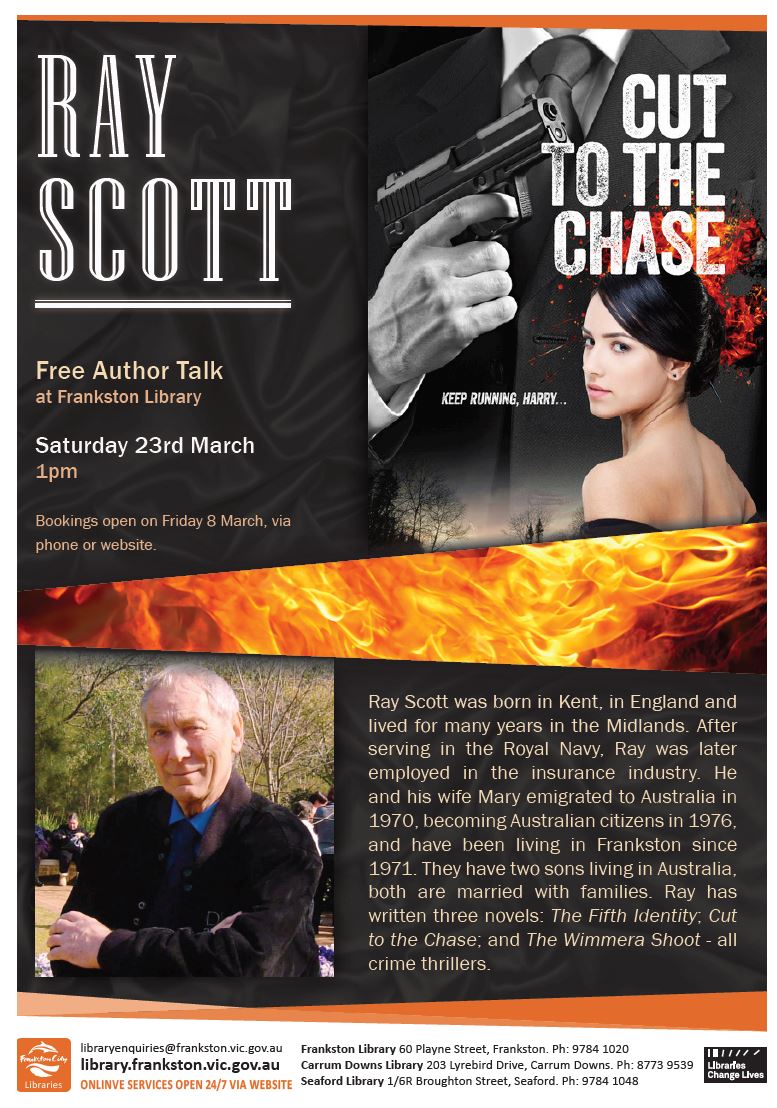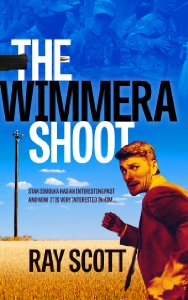Frankston library



7th of March 2017
Stan Simolka, who services insurance clients in Victoria, Australia, pauses at a lay-by on a country highway. Another car pulls in behind him and disgorges four armed men, who open fire on him. He takes to his heels and successfully evades them.
He cannot explain the attack, but a similar incident occurs days later. He goes undercover to ascertain the reason for these attacks, which he traces to an incident when he was a combatant in a civil war years before.
There is an exciting chase through country Victoria, but with his past military experience he is able to resist and fight off his pursuers.

Rigours of Speech
Since 2014, speaking engagements have been undertaken in Melbourne and environs, to Probus, Rotary and Lions clubs. Talks have also been conducted in libraries in Byron Bay and Tweeds Heads.
The subject matter of these speeches deals with the hazards of book writing going back over the last few centuries, when writers such as William Shakespeare, the Brontë sisters, Jane Austen, Alexandre Dumas, Victor Hugo, all writers with a tremendous output, had to write all their works in longhand and without the ease of writing conferred by fountain pens and ball point pens. After writing three or four words they all had to dip their pen (or quill) back into the inkwell to replenish it, with the attendant danger of blots and smudges.
In the more modern era, starting in the late 1800s, the typewriter appeared, which moved on from mechanical to electric before the appearance of the word processor and now the computer. Writers themselves have consequently become more prolific in output, and more numerous, which makes the task of literary agents and publishers more difficult. These days they are besieged as more and more aspiring writers find it easier to deal with the mechanics of the actual writing of books and stories, consequently manuscripts are submitted to them by the thousand.
Speaking, like writing, is a means of getting the message across, it can be very hard, but only if you do not prepare. My talks on this subject have, in the main, been delivered to Probus clubs in the south-eastern suburbs, Rotary clubs have also been on the agenda and provide excellent audiences.
It is to be hoped, as a result of these speaking activities, that more and more people are aware of the difficulties experienced by authors these days, particularly those of us who have not attained the giddy heights of J.K. Rowling or Michael Connelly and others.
There are many gifted writers submitting their works to publishers today, many are excellent story tellers on a par with those who are best sellers, but the difficulty is obtaining recognition. All one can do is persist in plugging away, writing and publicising one’s work.
This year, 2017, my wife and I have enjoyed the hospitality of Carrum Downs Rotary, Mount Martha Ladies Probus, Mornington Rotary and the Mentone and Mount Eliza Probus clubs. One of the more uplifting comments was received via e-mail from a member of one of these clubs which read;
” My husband grabbed your book when I got home and not long into it he said; ‘This is a good book,’ and he is still by the fire reading it.”
Comments like this make it all worthwhile and do wonders for the morale. Since receiving and reading that communication I have been pounding the keys of my computer with even greater enthusiasm.
2nd of May 2014
Ray publishes his second book ‘Cut To The Chase’
The action takes place in Australia, Jakarta and later in England. A businessman inadvertently becomes involved in international espionage. He gains access to secret information but whilst in England is framed for the murder of a foreign national in London by people who wish to discredit and silence him. He takes to the English canal system to evade capture while MI 5 and ASIO attempt to clear his name and expose the plotters.
This book is available from the author and from Farrell’s Bookshop, 143 Main Street, Mornington.
Copies signed by the author are also available from Dymocks Bookshop, Shop 113-114 in Camberwell Shopping Precinct at 793 Burke Road, Camberwell.
1st of January 2012
Published: “The Fifth Identity”…initially released as “The Man Who Had Five Lives” in 2012 and re-released in 2016 under the new title
A man is discovered murdered in a hotel in London and police investigations have difficulty in establishing who committed the crime and they are also unable to find a motive.
The investigation is further complicated when it is discovered that the victim is a millionaire businessman and that he has died intestate, has never made a will and apparently has no close family. His lawyers are appointed as administrators of his estate and have the task of trying to trace beneficiaries, but soon discover that the deceased is not who he claimed to be, he has been living and transacting business under a false name for many years.
A firm of private investigators is appointed to establish his true identity and to attempt to find beneficiaries to his estate, and also to find out why he has been living a double life for all those years. Their investigations have to track back to the years prior to the Great War of 1914-18 and to the subsequent conflict of 1939-45 to ascertain who he was, a search that takes them through government departments, through M.I.5 and to country towns in England, to New York and to Australia before they are able to resolve the mystery of his identity.
